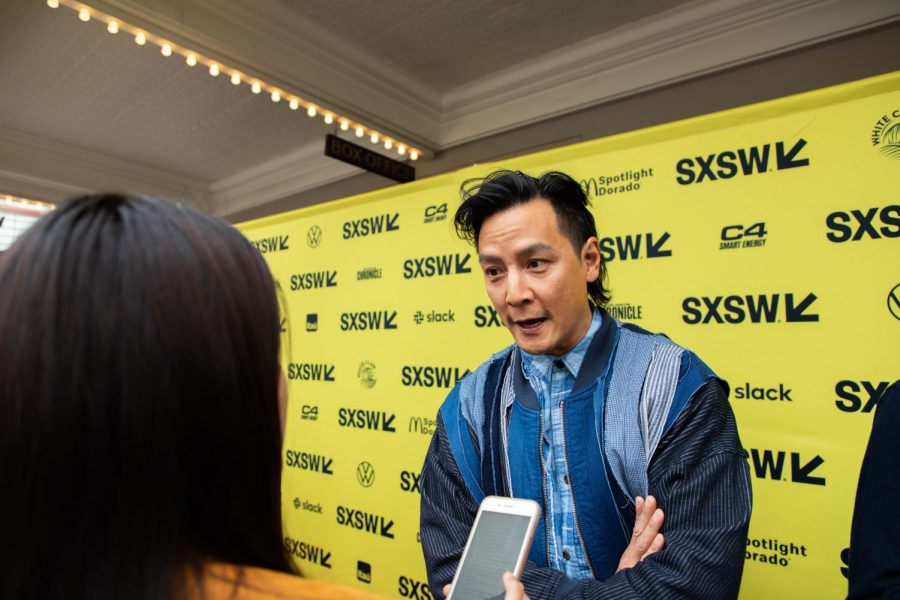Q&A: Disney+ series ‘American Born Chinese’ makes world premiere at SXSW
March 19, 2023
Based on a Gene Luen Yang graphic novel of the same name, “American Born Chinese” follows Jin (Ben Wang) through his sophomore year of high school as he tries to fit in. When he meets Wei-Chen (Jimmy Liu), a foreign exchange student, Jin gets stirred into a conflict with gods from Chinese mythology.
The Daily Texan took to the red carpet to ask executive producers and cast members about the coming-of-age action comedy series, which made its world premiere on Wednesday.
The Daily Texan: How did you weave the graphic novel’s separate storylines into the show’s eight episodes?
Kelvin Yu (executive producer, showrunner): That was challenge number one because Jin did something really special in the graphic novel which shows how the different worlds come together, but they don’t come together until the end. … (The show) still reflects the fractured identity the main character has, but it’s within each episode instead. There is one episode that’s almost entirely in Chinese, so we do jump over to another world at one point.
DT: How were the action sequences filmed?
KY: First, we got Destin Daniel Cretton from “Shang-Chi.” Destin brought in Peng Zhang, who was the stunt coordinator on “Captain Marvel 2” and worked on “Kick-Ass.” He’s from China and a stuntman himself. That was a whole new world of storytelling I had never been part of — I come from (writing) “Bob’s Burgers.” Peng and his team were operating 30 feet in the air. … It was incredible to watch what they do and how they tell a story, how they do it with their bodies and incredible skills. Sometimes we were (on set) until 4 or 5 a.m. because good stunts don’t just happen. They happen only when you take your time.
DT: What were you looking for when casting the characters?
Melvin Mar (executive producer): We really focused on Ben and Jimmy. We thought of it as a relationship between two boys who were polar opposites, like a buddy comedy. Once we found them, it was the center of all of it. We aimed high, we got ourselves Michelle Yeoh, and it’s been great, but it all starts from the material, Gene’s book and Kelvin’s script.
DT: How did you prepare for your role?
Ben Wang: Honestly, most of it was just (being) the most awkward, terrified version of myself. Everything else fell into place. My friends in the show are my friends in real life, and my family in the show feel like my family.
Sydney Taylor: (Amelia) was my first bigger character. She was more fleshed out; I got a lot more say in how she looked, and if there were certain things that didn’t feel quite right to me, I felt that I could bring those up.
DT: How do you resonate with your character?
Chin Han: I am intrigued by the father-son relationship. I feel that in a lot of movies, it’s very typical (that) Asian fathers are destined to be detached, stern (and) very strict. I don’t think that reflects the reality of Asian families. I think (they’re) missing the nuances of the father-son relationship. That was something I wanted to explore and was attracted (to).
Daniel Wu: In “Journey to the West,” (the Monkey King) is a young rebellious guy with his own thoughts and becomes an outcast, but then he proves himself and becomes enlightened. (In the show), he has a son who is behaving in a very similar way to (how) he was. He’s trying to control his son, but at the same time, he recognizes (their) same characteristics. He’s trying to be a dad like, “How much do I allow him to be himself? How much do I hold him back?” I’m playing the Monkey King as a dad (myself).
DT: When you grew up, there weren’t many projects that had this kind of Asian representation. What do you hope kids like your daughter will take away from watching “American Born Chinese”?
DW: What (representation) does for someone like (my daughter) is it opens up the world differently. It makes her feel like she’s part of this country as well. That’s really important — shows like this where we get to see our stories and culture on screen, not in a foreign environment, but (rather) in the American environment.



